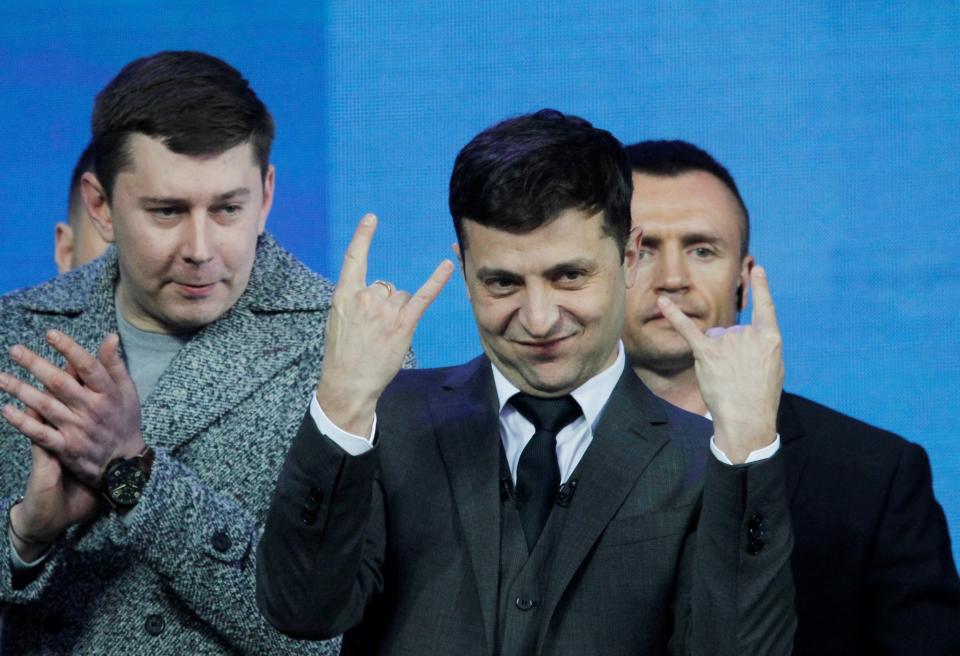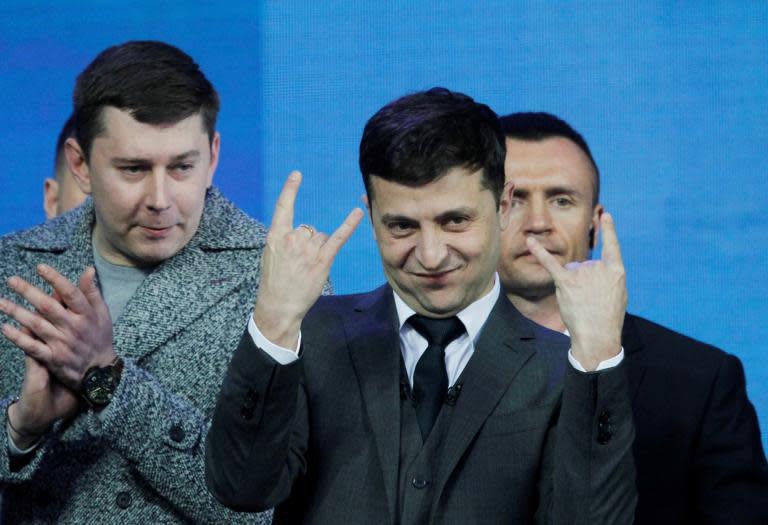Ukraine is on the verge of a new political era but one question remains: What is it?
There seems to be only one question hanging over Ukraine’s presidential election on Sunday: whether Petro Poroshenko can narrow the gap in any significant way so as to avoid complete humiliation.
Polls have consistently shown Mr Poroshenko – Ukraine’s president for the last five, often tumultuous years – far behind Volodymyr Zelensky, a comic actor whose only previous political experience amounts to playing president in a sitcom.
In recent days, the gap has only grown bigger, the latest figures suggesting a 73-27 split.
Friday’s face-to-face debate at Kiev’s Olympic Stadium was the incumbent’s last chance to persuade voters of his message. His task was clear enough: contrast his perceived strength with his opponent’s weakness and inexperience.
The debates were remarkable, fiercely contested, and an example to other former Soviet states of the drama of changeable government.
But they only served to highlight a different contrast: Mr Poroshenko’s two decades in politics against the blank slate offered by Mr Zelensky.
Ukraine is almost certainly now entering a new political era – but one that has very little clarity about it.
Mr Zelensky, in an attempt to glide to victory, has offered voters a minimalist programme. He has offered most things to everyone: from fighting corruption to rising wages and ending the war in the east. But there has been little detail – on policy or personnel – to offer a clear picture of Ukraine’s future.
Leonid Kravchuk, Ukraine’s first ever president, said the country’s embrace of an inexperienced showman represented a verdict on three decades of political failure.
“Ukraine is tired of its politicians, who for 28 years have been unable to organise life, deliver democracy, wellbeing or peace,” he told the Russian paper Komsomolskaya Pravda. “The people are tired, and believe it’s time to turn over a new page.”
According to Sergii Leshchenko, a reformist MP now touted as a future member of Mr Zelensky’s team, Ukraine was voting to give itself “space.”
“The country needs to break the status quo and renew itself and the political classes,” he told The Independent. “Zelensky will find it harder than Poroshenko had it, because there was a real window of opportunity after 2014, with the country still in shock. It’s been five years of wasted opportunity, but at least Poroshenko is now on his way out.”
Mr Leschenko, who says he is aware of the outlines of Mr Zelensky’s likely team, says the showman is set to offer positions to people with experience and real democratic clout. But in the rush to flesh out the team, there will also be plenty of room for less traditional appointments, he says.
What seems certain is that soon there will be many new, young faces in the corridors of power.
“Zelensky is surrounded by young people, most of whom are new to high politics” he says. “Some of them even think I’m too old to be involved.” (Mr Leschenko is 38 years of age.)
The shake-up of Ukraine’s political elite is likely to provoke resistance from obvious and less obvious sources.
Mr Zelensky is well known to all of the country’s oligarchs, his company having performed at many of their birthday parties. The comedian’s links to the controversial tycoon Ihor Kolomoisky are also well known. It will be a major test of the actor president’s strength of character whether he will be able to stand his ground.
“I hope and believe he can manoeuvre and keep distance from the oligarchs,” says Mr Leshchenko. “He’s smart and understands his historical moment.”
Another source of tension comes from Ukraine’s civil society and the intelligentsia, who have been reluctant to embrace Mr Zelensky’s candidacy. The reasons are varied, and include criticism of his populist programme.
But part of it also is a fear of losing political weight, says Nataliya Gumenyuk, the prominent journalist and founder of Hromadske, the country’s first independent public broadcaster.
“Over the last five years, many activists have been catapulted into positions of new, albeit limited influence,” she says. “They criticised Poroshenko, didn't particularly like him, but they knew him and thought they could be heard. Zelensky, on the other hand, is totally alien.”
Civil society activists faced a choice: either go into opposition or to try to build new relations from scratch.
Mr Leshchenko said it would be a mistake for civil society to continue to keep their distance.
“Mr Zelensky needs people ready to fight the oligarch consensus,” he says. “Zelensky may be a blank slate, but it’s also a real opportunity for us all.”


